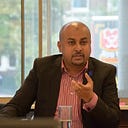To bury or not to bury… that is the question
I had a conversation with a friend from Sri Lanka recently. Both of us being from the Muslim minority community we were reflecting on the current state of things with regards the cremation of COVID-19 burials enforced by the Sri Lankan government despite no substantiated technical or scientific evidence, going against all of international guidance from the World Health Organisation and the International Committee of the Red Cross. He told me of the heartbreaking discussion he had with his family just in case of his untimely death. In the event if there was any suspicion that he had died from COVID-19, he had requested his family not to pursue with the burial, dispute the cause of death or even claim his body from the hospital, putting the burden on them to cremate. Instead he requested his family to allow the authorities to cremate his body as they have been doing with other unclaimed bodies of covid victims. Instead he had asked his family to say a prayer for him and plant a tree in his memory. This was a difficult conversation for me to have for two reasons.
The first being the mental anguish that people are going through in Sri Lanka around being accused of having covid, but that in many cases, people who have died of other causes are being labelled as having died of covid-19. Either through sheer incompetence or malicious intent (given that many of those who have died have been from minority communities), there is a culture of fear pervading people in Sri Lanka around COVID-19.
The second difficulty for me was the state of my friend’s mind in asking his family not to claim his body and to allow the authorities to cremate the body. Such is the state of anguish and mental pressure affecting Muslims and Christians in Sri Lanka, that this is a real concern for their final rites. I could only imagine the courage that it takes for one person to have that conversation with your family members.
Like other cultures, the Muslim community have their own set of rituals, worship and traditions to help ease the pain. Within Islam, the management of dead bodies is the object of specific rules that are aimed at ensuring the dignity and respect of the dead as well as for their surviving relatives. In this sense, for Muslims, cremation is not only prohibited but it is viewed as a desecration of the deceased. This is based on the metaphysical belief of a connection between the body and soul even in death, and thus it is unthinkable for that type of treatment to be inflicted on the body in death.
In enforcing cremations, without any recourse to appeal, the Government stands accused of disregarding and being insensitive to the needs of the minority Muslim and Christian and marginalizing them. When I tried to discuss this with another friend of mine, who comes from the majority Sri Lanka ethnicity, it was explained away as saying “the trust with the Muslim community was lost after the Easter Sunday attacks and so this is the reason”. This is flabbergasting and really is a sign of the state of thinking especially amongst the majority.
It is this thinking that is plaguing people like my friend, causing unnecessary mental stress and anguish on top of the disruptions caused by the covid-19 lockdown. It is this exclusivist thinking that will push people to the extremes, thinking that they are not welcome and have no place.
To paraphrase a famous bard: To bury, or not to bury, that is the question:
Whether ’tis nobler in the mind to suffer The slings and arrows of outrageous fortune, Or to take arms against a sea of troubles And by opposing end them.
How do we oppose them?
